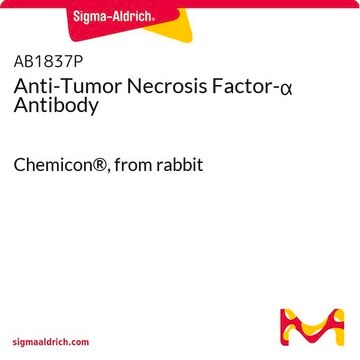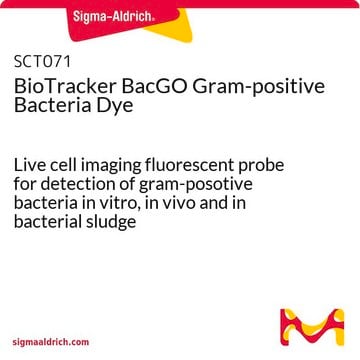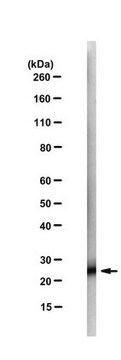05-168
Anti-TNFα Antibody, clone MPG-XT3
clone MPG-XT3, Upstate®, from rat
Sign Into View Organizational & Contract Pricing
All Photos(1)
About This Item
UNSPSC Code:
12352203
eCl@ss:
32160702
NACRES:
NA.41
Recommended Products
biological source
rat
Quality Level
antibody form
purified immunoglobulin
antibody product type
primary antibodies
clone
MPG-XT3, monoclonal
species reactivity
mouse
manufacturer/tradename
Upstate®
technique(s)
neutralization: suitable
isotype
IgG1
NCBI accession no.
UniProt accession no.
shipped in
dry ice
target post-translational modification
unmodified
Gene Information
human ... TNF(7124)
General description
The concentration of antibody needed to neutralize the bioactivity of TNF-α will depend on the cell type, the incubation conditions, and the biological response studied.
Specificity
mouse TNF-α; does not recognize human or rat TNF-α
Immunogen
Recombinant murine TNF-α
Application
Research Category
Signaling
Signaling
Research Sub Category
Growth Factors & Receptors
Growth Factors & Receptors
This Anti-TNFalpha Antibody, clone MPG-XT3 is validated for use in NEUT for the detection of TNFα.
Quality
routinely used to neutralize 50% of the cytotoxic effect of recombinant mouse TNF-α on actinomycin D treated L929 cells.
Target description
17 kDa
Linkage
Replaces: 04-1114
Physical form
0.01M Tris-glycine, 0.15M NaCl, pH 7.4
DEAE chromatography
Format: Purified
Storage and Stability
2 years at -20°C
Legal Information
UPSTATE is a registered trademark of Merck KGaA, Darmstadt, Germany
Disclaimer
Unless otherwise stated in our catalog or other company documentation accompanying the product(s), our products are intended for research use only and are not to be used for any other purpose, which includes but is not limited to, unauthorized commercial uses, in vitro diagnostic uses, ex vivo or in vivo therapeutic uses or any type of consumption or application to humans or animals.
Not finding the right product?
Try our Product Selector Tool.
Storage Class
12 - Non Combustible Liquids
wgk_germany
WGK 1
flash_point_f
Not applicable
flash_point_c
Not applicable
Certificates of Analysis (COA)
Search for Certificates of Analysis (COA) by entering the products Lot/Batch Number. Lot and Batch Numbers can be found on a product’s label following the words ‘Lot’ or ‘Batch’.
Already Own This Product?
Find documentation for the products that you have recently purchased in the Document Library.
J A Guevara Patiño et al.
Journal of immunology (Baltimore, Md. : 1950), 164(4), 1689-1694 (2000-02-05)
Apoptosis is one of the key regulatory mechanisms in tissue modeling and development. In the thymus, 95-98% of all thymocytes die by apoptosis because they failed to express a TCR with an optimal affinity for the selecting intrathymic peptide-MHC complexes.
A Kunitz-type protease inhibitor, bikunin, inhibits ovarian cancer cell invasion by blocking the calcium-dependent transforming growth factor-beta 1 signaling cascade
Kobayashi, H., et al
The Journal of Biological Chemistry, 278, 7790-7799 (2003)
C K Yu et al.
International archives of allergy and immunology, 112(1), 73-82 (1997-01-01)
Dermatophagoides farinae (Der f) is one of the most common species of dust mites that induce asthma and allergic rhinitis. We have reported that Der f challenge on sensitized mice elicited a distinct type of hypersensitivity, called early-type hypersensitivity (ETH)
Cytokine mRNA in the central nervous system of SCID mice infected with Toxoplasma gondii: importance of T-cell-independent regulation of resistance to T. gondii.
Hunter, C A, et al.
Infection and Immunity, 61, 4038-4044 (1993)
Role of laminin-1, collagen IV, and an autocrine factor(s) in regulated secretion by lacrimal acinar cells.
L Chen, J D Glass, S C Walton, G W Laurie
The American Journal of Physiology null
Our team of scientists has experience in all areas of research including Life Science, Material Science, Chemical Synthesis, Chromatography, Analytical and many others.
Contact Technical Service








